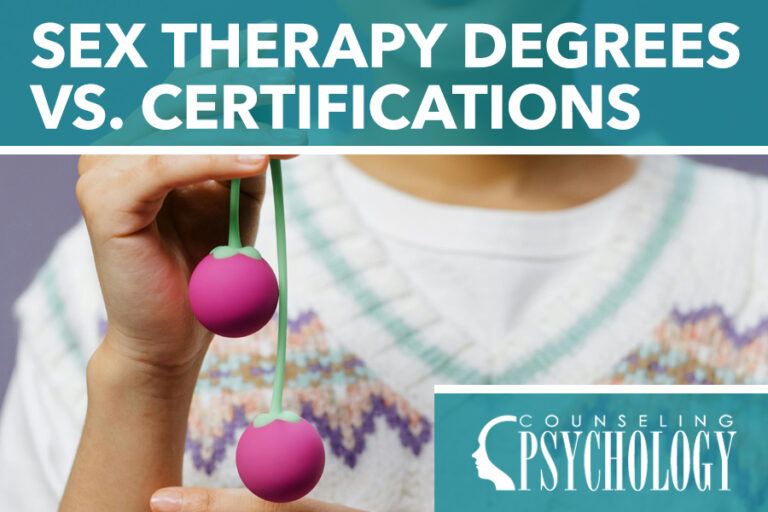Sex Therapy Degrees vs. Certifications: Which Educational Path Is Right for You?

For mental health professionals and aspiring therapists interested in specializing in human sexuality and intimacy issues, two primary educational paths exist: academic degrees focused on sexuality studies and professional certifications in sex therapy. Each option offers distinct advantages, requirements, and career outcomes. This comprehensive guide explores both pathways to help you determine which educational route aligns best with your career goals, resources, and timeline.
Foundation: The Baseline Requirements
Before diving into specialized sex therapy education, it’s important to understand that both paths typically require a foundational mental health degree and licensure. Sex therapy is considered an advanced specialization, not an entry-level profession.
Common prerequisites include:
- Minimum of a master’s degree in counseling, master’s in psychology, or master’s in marriage and family therapy or a degree in medicine
- Current licensure or certification in your core mental health discipline
- Clinical experience in general mental health counseling
This foundation serves as the platform upon which you’ll build specialized knowledge in human sexuality and therapeutic interventions for sexual concerns.
Academic Degrees in Human Sexuality
Types of Sexuality-Focused Degrees
Several universities and institutes offer graduate-level academic programs focused specifically on human sexuality:
- Master’s in Human Sexuality Studies: Programs like San Francisco State University’s and Widener University’s provide comprehensive theoretical knowledge in sexuality.
- PhD in Human Sexuality: The California Institute of Integral Studies and Widener University offer doctoral programs combining research and clinical applications.
- Graduate Certificates in Human Sexuality: Schools like University of Michigan and University of Minnesota offer certificate programs that can complement existing degrees.
Benefits of Academic Degree Programs
Academic degree programs in sexuality studies offer several distinct advantages:
- Comprehensive Knowledge Base: Extensive coursework covering biological, psychological, sociological, and cultural aspects of human sexuality
- Research Opportunities: Engagement with current research and the opportunity to contribute to the field through original research
- Academic Credibility: Formal academic credentials from accredited institutions
- Networking Within Academia: Connections with faculty researching sexuality and potential pathways to teaching positions
- Broader Career Options: Preparation for roles in education, research, policy development, and clinical practice
Limitations of Degree Programs
Despite their benefits, sexuality-focused degree programs have certain drawbacks:
- Time Commitment: Typically requires 2-5+ years of full-time study
- Financial Investment: Total costs can range from $30,000 to $100,000+
- Limited Geographic Availability: Few universities offer specialized sexuality degrees
- Not Automatically Clinical: Some programs focus more on theory and research than clinical application
Professional Certifications in Sex Therapy
Major Certification Pathways
Professional certifications offer an alternative route to specialization in sex therapy:
- AASECT Certification: The American Association of Sexuality Educators, Counselors, and Therapists offers the most widely recognized certification in the field
- AACAST Certification: The American Association of Couples and Sex Therapists offers a Certified Couples & Sex Therapist credential
- Institute-Specific Certifications: Organizations like the Modern Sex Therapy Institutes offer specialized training and certification
The AASECT Certification Process
The AASECT certification pathway involves:
- Sexuality Education: 90 hours of human sexuality education covering core knowledge areas
- Sex Therapy Training: 60 hours of training in clinical strategies and techniques
- Clinical Experience: 300+ hours of supervised clinical experience with sex therapy clients
- Supervision: 50+ hours of supervision with an AASECT-approved supervisor
- Professional Ethics: Adherence to the AASECT Code of Ethics
Benefits of Professional Certification
Sex therapy certification offers several advantages:
- Practice-Focused: Direct emphasis on clinical skills and therapeutic techniques
- Flexibility: Can be pursued while maintaining a clinical practice
- Time-Efficient: Typically completed in 2-3 years of part-time study
- Cost-Effective: Total investment generally ranges from $5,000 to $20,000
- Professional Recognition: Immediately recognizable credential within the field
- Practical Networking: Connections with practicing clinicians rather than academics
Limitations of Certification Routes
Certification pathways also have certain drawbacks:
- Narrower Focus: Less emphasis on theoretical frameworks and research
- Less Academic Recognition: May not satisfy requirements for academic or research positions
- Ongoing Requirements: Continuing education and recertification necessary
- Supervision Challenges: Finding qualified supervisors can be difficult in some regions
- Variable Recognition: Public and healthcare systems may be less familiar with certifications than degrees
Combining Approaches: The Integrated Path
Many successful sex therapists pursue a combination of academic education and professional certification:
- Completing a master’s or doctoral program in a core mental health discipline
- Adding a graduate certificate in human sexuality studies
- Pursuing AASECT certification for clinical recognition
- Engaging in continuous education through workshops, conferences, and specialized training
This integrated approach combines the academic foundation of formal education with the clinical focus of professional certification.
Making Your Decision: Key Considerations
When deciding between degree and certification pathways, consider:
- Career Goals: Research and academic positions typically require degrees; clinical practice can be well-served by certification
- Available Resources: Honest assessment of time, money, and geographical constraints
- Learning Style: Preference for academic or practical, applied learning environments
- Existing Credentials: Your current educational background and licensure status
- Timeline: Desired timeframe for entering specialized practice
There’s No Single “Right” Path
Both degree and certification pathways can lead to successful careers in sex therapy. The “right” choice depends entirely on your individual circumstances, goals, and resources. Many professionals find that starting with certification to build clinical skills and later pursuing academic credentials for depth of knowledge offers a balanced approach to professional development.
Regardless of which path you choose, commitment to ethical practice, cultural competence, and ongoing learning remains essential in this sensitive and evolving field. The journey to becoming a qualified sex therapist requires dedication to both academic knowledge and clinical excellence—whether pursued through formal degrees, professional certification, or a thoughtful combination of both.



